Joy Neal Kidney's Blog, page 73
March 22, 2021
Compelling Feedback for a Teacher and Mentor
Twice in one day I received notes about the far-reaching influence of a teacher on a man’s career. Here is another of them, shared anonymously:
—–
“I am assuming that . . . you must be the [teacher] who taught me Math at [____] Senior High School. If so I would love to reconnect, although I am not super active on Facebook.
“You are one of the most influential people on my life. I went on to get a Math degree at Iowa State, but you getting me started on Computer Science was what defined my life, and I owe you a huge Thank You. I got a double major in Math and Computer Science at ISU, then went to UIUC (University of Illinois at Urbana Champaign) for a Masters and 2 more years after that.
“I ended up working at Intel for 23 years. I guess my biggest claim to fame there was being a member of the Software Directors Council. About 40 people who made all the rules that all the 20,000 programmers at Intel had to follow when developing software. I was on a team of Parallel Programming experts led by David Kuck (you can find him on Wikipedia). The parallel programming tools we developed became critical when multicore processors came on the scene.
“Pixar (who made Toy Story and other computer rendered movies) had a huge server farm making those movies. We sent a team out there and sped up their process by 26 times using the same computers they already had. So a movie sequence that had taken 26 days of computing got done in one, which let them do higher quality image rendering.
“GE healthcare used us to speed up their MRI machines- so that the computing needed to create an MRI image could be done 8 times faster on the same machine. That meant it changed from ‘we will look at the MRI image tomorrow’ to ‘wait in the office, we’ll have the image in an hour.’ And the same multimillion dollar machine could now do 8 times as many images, making the costs go down a lot.
“So whether you realized it or not, You were a part of making those things happen. I have thought about you and Mr. [____] and Mr. [____] numerous times over the years, and more so now that I am retired.
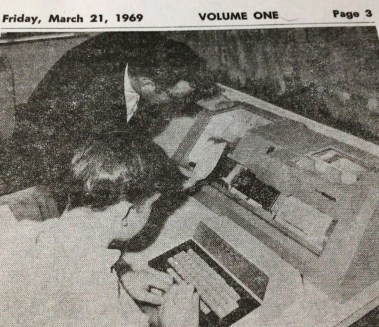 The honored teacher with a student and a keypunch machine.
The honored teacher with a student and a keypunch machine.“Thank you for getting that keypunch for us and setting up the deal with Grinnell to let us run programs. That start got me a summer internship for two summers at Argonne National Labs. I was solving 10 variable differential equations on the computer for Physicists Analyzing Nuclear Reactor Safety. I needed both the Math and the Computer skills to do that.
“Thank You!”
March 19, 2021
Paul Marston: Teacher and Mentor–by Jerry O’Brien
 Jerry O’Brien
Jerry O’BrienI and many others were truly lucky to have Paul Marston as a teacher at Adel High in 1974.
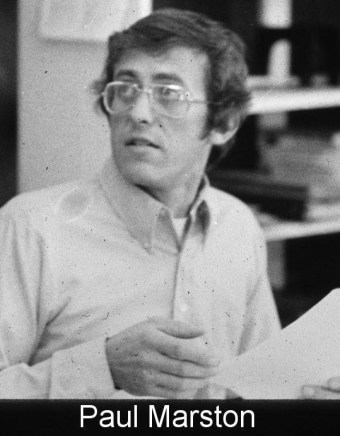
Please allow me this little story to show an insight into this great man who changed my life for the better:
My assignment one week was to write a paper on Diogenes, famous in the ancient world for “searching for an honest man” with his lantern. I thought it would be an easy assignment, and sadly I cut corners and thought I would fool people easily by simply copying text directly from an encyclopedia and its bio on Diogenes. I changed a few words and before the assignment was due. Mr. Marston asked to see our work, one by one, to make sure everything was standing tall before we handed it in. I recall like yesterday how when it was my turn to come up beside his desk, to have him review the paper, I felt a little worried, as I did not know much about him. What if he caught the plagiarism?
So, as he reviewed the one page paper I could tell something was not right – some quiet tension in the air. He said something like – “Jerry, you know, as I read this, it is ok…but you may want to find other books in the library here that have information on Diogenes, and then put it all together. This reads a little generalized and seems like it only came from one source.”
And then he walked over and brought back the “D” encyclopedia from the corner in the room, this being the exact encyclopedia I had copied from. He opened the book at his desk, came to the bio of Diogenes. I still see the pen and ink drawing in my mind of Diogenes “looking for an honest man” with his lantern, the irony of the moment was not lost on me.
Then Mr. Marston’s greatness, gentleness, non-judgmental attitude came through, and he simply moved his finger along the bio in the encyclopedia and his other by my nearly word for word account. And he simply shut the encylopedia once the point was made and handed the paper back and smiled and said, “Yes, maybe just get a few more sources, put it all together as I know you can and bring it back in your voice, Jerry.”
Well, I was relieved he did not rake me over the coals. I went back to the library and reviewed 5 sources and wrote the new paper in my own words. I handed it in. It may have been one of the greatest lessons I ever learned – because I really loved writing and it taught me to always use my voice and search for the truth in every story.
It also showed me people are human – and make mistakes – and that a gentle nudge in the right direction – and a quiet word – is more powerful many times than a sledge.
I ended up writing for a living for a Fortune 6 corporation as a Director of Communications – and I still write for them to this day. Mr. Marston did his duty in the US Army and teaching and then returned to farming – as that is where I feel his truth and beauty were. I always admired him when I heard how he had gone back to the family farm. As it was just like the great Roman Cincinnatus – who led in the Army and then returned to farming.
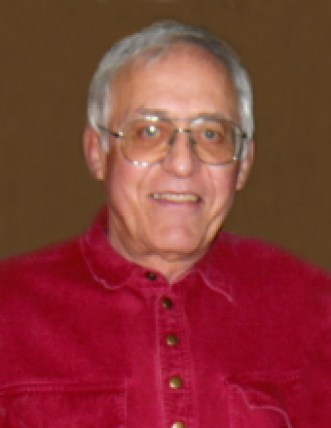 Paul Marston in later years
Paul Marston in later yearsI so appreciate the short intersection of our lives had. God bless him and his family – he is the type of person who has made us a better version of ourselves.
March 17, 2021
Dexter (Iowa) Essentially a College Town–Dexter Normal College
It’s been a surprise to learn that at one time, tiny Dexter, Iowa–with a population never over 800 citizens–used to be a university town.
—–
Building the three-story Dexter Normal School was started the fall of 1878, and was ready for use by fall or winter of 1879. The brick structure measured 57 by 67 feet with a half mansard roof, tower, and all modern improvements. It sits on about three acres of land at the north end of Marshall Street, in Allen’s addition near the public school building.
Heated by hot air pipes, the school cost $6000 to build. Benjamin J. Bartlett of Des Moines was the architect, and was erected by a stock company, comprising the businessmen of Dexter and farmers from Dallas, Guthrie, Adair, and Madison Counties.

The main building was a fine, three-story brick structure, fully equipped for educational work of the highest efficiency, according to publications, and provided with all the necessary modern educational methods. On the first floor of the building shown was the physical culture rooms, the laboratory and the offices devoted to the business department. The second floor held the rooms for recitation, a library, and college offices. The chapel hall, the art studio, the conservatory of music, and the musical practice rooms were on the third floor.
The dormitory was large and commodious, where the students enjoy all the comforts of home life. A large steam plant furnished heat to all the rooms. In the dining hall, the students sat down daily to excellent fare, in company with the president and seven other members of the faculty, who made it their home.
Six Different Courses of Study
Six different courses were included in the college curriculum–a Normal course, a Classical course, a Literary and Scientific course, a Business department, and departments of Music and Art.
The Normal course was one of the strongest in the college, and “much thought and time has been employed in its arrangement. It covers three school years of forty-four weeks each. The teachers in this department are all graduates of good normal schools, and special attention is paid to psychology and methodology.”
The Classical course also required three years to complete, but students were allowed to take advanced classes when, upon examination, they were found sufficiently advanced. This was also true of the Literary and Scientific course.
The Business department “fully prepared its graduates for business life, affording very full teaching in theory, as well as a very large amount of practice in accordance with the best modern methods.” The conservatory of music was modeled after the “best and most progressive institutions of the kind in the country.” The art department, under the direction of competent instructors, taught drawing of all kinds, specializing in oil and water color painting.
Dexter Essentially a College Town
No Evil Influences to Counter-act the Good Ones of the School
Although the college was entirely non-sectarian, every member of the faculty was a member of some church. “All persuasive influences are employed to have the students attend some church during their residence at the college.” Dexter was essentially a college town, in which there were “no evil influences to counter-act the good ones of the school. Viewing the institution from every standpoint there are few schools in the country more desirable, and parents and guardians seeking a suitable college for educating their children should write for a catalogue giving full particulars.”
According to Ron Howell, initially the curriculum included civil government, rhetoric, grammar, natural philosophy, arithmetic, orthography, didactics, algebra and vocal music. Students were housed on campus at the Bisbee Dormitory, or they could find off-campus housing for $2.24 per week.
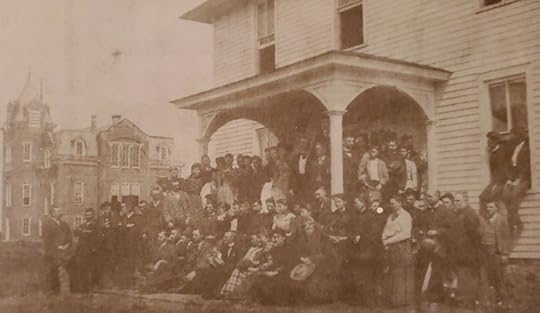 Bisbee Dormitory. You can see the Normal College to the left.
Bisbee Dormitory. You can see the Normal College to the left.The first commencement was held in 1883.
 No names, no date.
No names, no date.From the 1890 Commencement Program, students were listed from Adel, Corning, Cottage, Correctionville, Danbury, Des Moines, Dexter, Earlham, Greenfield, Marne, Menlo, Maquoketa, Minburn, Newton, Redfield, Spencer, Shelby, Utica, Waukee, and Winterset.
In 1890, Dexter’s census was 607.
By 1892, enrollment neared 600 students, essentially doubling the town. The curriculum expanded by 1893, adding the departments for business, art, and music. The Normal department added sciences and mathematics. The curriculum also included Latin, Greek, French, and German.
Positions are Secured for Worthy Graduates

But by 1895, the Dexter Normal School was no longer active. The building was demolished in 1905 to make room for a new high school on the same site.
—–
Sources: Clipping from an 1893 Homestead publication, thanks to Byron Weesner.
1968 Dexter Centennial History pages 21 and 22.
“Normal College” by Ron Howell in the Rural Schools of Madison County, Iowa FB page, 2017.
March 15, 2021
“Leora’s Letters” Interview with John Busbee
I hadn’t heard this interview with John Busbee since it was first aired a year ago last December. He just sent me a link to it.
I felt so at ease in his studio at Mainframe, and he made me feel like a real writer!
He begins with how we met. I’m a fan of Iowa History Journal. John had written an award-winning story for it about Iowa’s Littleton Brothers, all six of whom died as a result of the Civil War. At the end, it mentioned that he was writing a a book about the brothers.
He and another man gave a program about it at my local library, so I attended. Afterwards, I asked John how the book was coming. Then I mentioned the Wilson family of Dallas County who’d lost three sons during WWII, and that I was about to publish a book about them. He whipped out his business card and said to let him know when it was ready, that he’d like to interview me about it.
This takes 13 1/2 minutes, if you’d like to listen in.
 I look so serious, but I was having fun!
I look so serious, but I was having fun!John Busbee has edited and written the Foreword for Leora’s Dexter Stories: The Scarcity Years of the Great Depression, which should be published later this spring.
March 12, 2021
The Neal Brothers During the Civil War
War Between the States
I was shocked to learn that my ancestor Thomas Neal had at least two sons, Jesse and John, who served during the War Between the States. One in blue, one in gray.
John, my great great grandfather, did serve with in the Confederate Army, with the 3rd Forrest’s Tennessee Cavalry. I had the records to prove it.
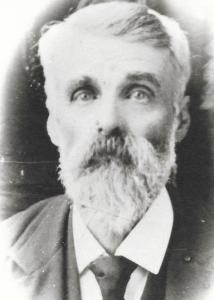 John Neal
John NealGrandpa Kenneth Neal knew that his grandfather had been in the Civil War, but was stunned to learn that he’d fought with the rebels. John Neal’s military records did reveal that he’d deserted.
Grandpa insisted that his grandmother Rhoda received a pension after John died, as a Union veteran. I sent an application for records of John Neal, this time with “Union” on it. He had indeed joined the 9th Regiment of the Indiana Cavalry.
John and Rhoda Neal are buried, with his parents, in the Dexter Cemetery. His brother Jesse is buried in the remote Roberts Cemetery in Adair County, Iowa. He served in Co. C 1st Tennessee Cavalry. I’ve never found a picture of Jesse Neal.
Rhoda (Marshall) Neal’s 1920 obituary said that she was “part of the most perplexing periods in the history of this country.” A very perplexing period indeed.
March 10, 2021
Spool Knitting: Growing Up on a Farm
Here’s more than you ever wanted to know about using a spool and a crochet hook to knit a little something.
Spool knitting, corking, French knitting or tomboy knitting uses a spool with nails around the rim to produce a narrow tube of fabric. The devices are called knitting spools, knitting nancys, or French knitters.
The technique is to wrap the yarn around the pegs, then lifting over yarn which creates a stitch. Repeat until the tube of knitting is the desired length.
In my case, I wanted pink shoelaces to go with my pink tennis shoes. Junior-high age. Everything needed to be pink. Dad didn’t have time to make the spool knitter for me, but he gave me small brads and a hammer, so I made my own. For some reason, I still have it. Looks like I had a little trouble with one nail.
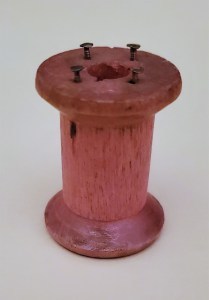
I even used pink nail polish to pretty up the plain spool.
I didn’t know that spool knitting is a traditional way to teach kids the basics of knitting. Spool knitters usually have four or five pegs or nails, although any number of them will work. The knitted tube that results can be wound in a spiral to produce a mat or rug.
Or left simply used as shoe laces.
I decided to see if I could still figure out how to do it, but only have four-ply yarn and regular crochet thread. I used pink crochet thread as a kid, so found some about the same weight. What a pain! My mantra is “tenacity trumps talent.” That must have been an early quality in my personality.
I must have been very determined to have those pink shoe laces.
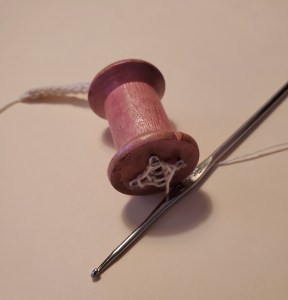
Pink shoe laces rang a bell. They were even part of a song in 1959, “Tan Shoes and Pink Shoe Laces.” I probably made mine a couple of years before the song came out.
Kids still do spool knitting today. Here’s how to make your own knitter and get started. Better yet, get a commercial one with fatter “nails.” It’d certainly be easier to use.
These days, I just buy shoelaces.
March 8, 2021
The Gallup Family of Nora Springs Also Lost Three Sons During World War II
I’d shared the February 6, 1943, clipping about the three Wilson brothers lost in WWII, when a man let me know that his great grandmother had also lost three sons. They were the Gallup brothers from Nora Springs, Iowa.
The man’s son had added a memorial to Gold Star Mothers to the Nora Springs Veterans Memorial as his Eagle Scout project, and to remember his great great grandmother.
Since then I’ve tried to learn more about their story.
The Gallup Family of Nora Springs, Iowa
The Gallup family had six sons and six daughters. One son was too young, but the older five served in the army.
The siblings: Ruth, born 1908, Maybelle 1910, Linnie 1911, Eva 1913, Ruby 1914. Yes, five daughters born before their first son.
Then Harold Gallup, born 1915, served in WWII.
Lucille, born 1917
Lloyd L. Gallup, born 1918, KIA 1943 in Italy, buried in Mason City, Iowa
Glenn Gallup, born 1920, served in WWII
Earl B. Gallup, born 1923, KIA 1944 in France, buried at Normandy.
Robert L. Gallup, born 1925, married with a child, KIA 1944 in Germany
LeRoy Gallup, no birth date but he was too young to serve in WWII.
—–
Robert Lynn Gallup (1925-1944)
ROBERT GALLUP OF NORA SPRINGS KILLED IN ACTION
THIRD MEMBER OF FAMILY TO LOSE LIFE IN SECOND WORLD WAR
Nora Springs, Ia. – Pfc. Robert L Gallup, son of Mr. and Mrs. Charles Gallup, of Nora Springs, Iowa, is the third member of that family to lose his life in the present war.
Robert was killed in action in Germany, November 23rd, according to a telegram received by his relatives. He had previously been wounded in France, June 10th, and had received the Purple Heart.
Private Gallup went overseas last March and had not seen his baby Rosella Ann, born June 6th. He enlisted in October, 1943.
Robert’s wife lives with her mother, Mrs. Rose Watts, at Mason City. He was one of a family of 12 children. Surviving are three brothers and six sisters.
Previously killed in action in the present war were Pfc. Lloyd Gallup in Italy, October 14, 1943, and Pvt. Earl Gallup, in France, July 23, 1944.
Surviving brothers are Cpl. Glenn Gallup and Pvt. Harold Gallup, both overseas, and a younger brother, LeRoy, at home.
Waterloo Courier, Sunday December 17, 1944
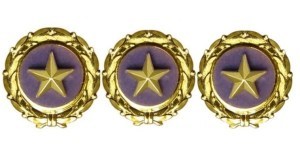
When I noticed that their father had died in 1948, I expected it to be a similar death to Clabe Wilson after losing three sons–a stroke and a broken heart. But Mr. Gallup’s death was caused by thugs who’d been drinking:
Charles Floyd Gallup – May 23, 1888 – July 17, 1948
MURDER COUNT FILED AGAINST SIX IN FLOYD
Charles City, Iowa – Sheriff B. F. Atherton late Monday said he had filed charges of murder against Arthur Ubben 24, and Robert Garlock, 19, both of Thornton; Orin Lee Burns, 25, Hampton; Harold Riekens 31, Kenneth McClemmons 19, and Johnny Just 21, all of Sheffield in connection with the death of Charles Gallup, 60, farmer near Nora Springs, who died shortly after an altercation with the six men Sunday night.
Justice John W. McGeeney said the men waived a preliminary hearing and were bound over to the grand jury with bonds of $5,000 being set for all except Burns, whom he said he would not admit to bail, as he had admitted in a statement to Sheriff Atherton that he was the one who had struck Gallup, but did not see him fall. None of the five had posted bonds early Tuesday.
Funeral services for Gallup were Tuesday afternoon at the Christian Church in Nora Springs, with the pastor, Rev C. W. Hicks, officiating, and burial in Rock Grove Cemetery, south of Nora Springs.
Mr. Gallup was the father of three sons who were killed in the military service during the recent war. Earl was killed in France, Lloyd in Italy and Robert Lynn in Germany.
Surviving are the widow and the following children: Mrs. Justus Borchers and Harold Gallup, Chico, California; Glenn, Dearborn Michigan; Mrs. Roy Wilson, Rockford; Mrs. D. L. Billings, Mrs. George Wilson and Mrs. John Keith, all of Nora Springs; Mrs. Henry Stepleton, Mason City, and Ray, at home.
He is also survived by two brothers, Frank, Nora Springs, and Will,, Chicago, Illinois; two sisters, Mrs. Clarence Mathieson, Estherville, and Mrs. Helen Batdorf, Patton Pennsylvania, a stepfather, Miles Fenn, Rudd, and two half- sisters, Mrs. Earl Johnson, Rudd, and Mrs. Eleanor Steffin, Chicago, Illinois.
Sheriff Atherton said all the men had made written statements except Just, admitting their part in what he termed a beer drinking party Sunday afternoon. According to their statements, Atherton said, the six had started drinking right after dinner and had driven from their homes through Rockwell and on to Rockford. There they bought gas and went on to Nora Springs on highway 18, about 8 p.m. Apparently Gallup came out to investigate and, according to the men’s statements, told them to “clear out”. In an argument which followed, according to their statements Gallup picked up a rock in each hand and there was a scuffle. After Burns had struck Gallup, the men drove away, stopping at Clear Lake before returning home they said. The car, Sheriff Atherton said was traced by Highway Patrolman Victor Rima, through a dent inflicted in the side of the car by a rock thrown by Gallup’s son, LeRoy, 14, and a shield on the license plate reading “Thornton Fire Department”.
Waterloo Daily Courier, Tuesday July 20, 1948.
I’ve not been able to find photographs of any of the brothers who were KIA, or any who served.
March 5, 2021
Danny’s Mastoid Surgery (poem)
Danny’s Mastoid Surgery
Dad blew smoke in Danny’s aching ear. A neighbornoticed the swelling. The Dexter doctor said to takeour four-year-old to Des Moines. Dad and Dannyboarded the train while Mom and the rest of usstayed home. My twelve-year-old brother cried.Dad came home alone. He’d watched themcut away bone to drain the mastoid. No visitingfor ten days, the nurses had warned, so Dannywouldn’t cry to go home. But Mom ‘phoned the nursesevery day until they said we could come get him.Our hearts were hopeful when we chugged all the wayto the big-city hospital in our Model-T. Danny,his head all bandaged and toenails polished by the nurses,spied Mom’s hat. He laughed and cried all at once.He reached out for her, spilling crayons everywhere.(2005)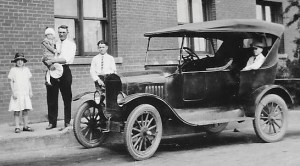 —–Leora’s Dexter Stories: The Scarcity Years of the Great Depression will be published this spring. This episode is in one of the first chapters.
—–Leora’s Dexter Stories: The Scarcity Years of the Great Depression will be published this spring. This episode is in one of the first chapters.
March 3, 2021
Guns and Gods in My Genes by Neill McKee
The Book
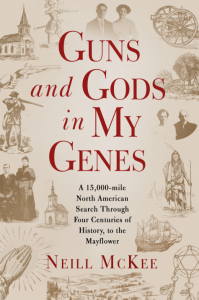
Neill McKee, author of the award-winning travel memoir Finding Myself in Borneo, takes the reader through 400 years and 15,000 miles of an on-the-road adventure, discovering stories of his Scots-Irish ancestors in Canada, while uncovering their attitudes towards religion and guns.
His adventure turns south and west as he follows the trail of his maternal grandfather, a Canadian preacher who married an American woman in Wisconsin, and braved the American Wild West from 1904 to 1907, finding a two-story brothel across from one of his churches and a sheriff who owned a saloon and dance hall, while carrying a gun with 20 notches, one for each man he had killed.
Much to his surprise, McKee finds his American ancestors were involved in every major conflict on North American soil: the Civil War, the American Revolution, and the French and Indian War. In the last chapters, McKee discovers and documents his Pilgrim ancestors who arrived on the Mayflower, landing at Plymouth in 1620, and their Puritan descendants who fought in the early Indian Wars of New England.
With the help of professional genealogical research, he tracks down and tells the stories of the heroes, villains, rascals, as well as, the godly and ordinary folk in his genes, discovering many facts and exposing myths. He also lets readers in on a personal struggle: whether to apply for Canadian-United States dual citizenship or remain only a Canadian.
Print Length: 352 Pages
Genre: Historical Travel Memoir
ISBN-13: 9781732945739
Guns and Gods in My Genes is available to purchase now on Amazon.com .
The Author
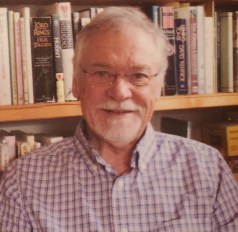
Neill McKee is a creative nonfiction writer based in Albuquerque, New Mexico. His first travel memoir, Finding Myself in Borneo, won a bronze medal in the Independent Publishers Book Awards, 2020, as well as other awards. McKee holds a Bachelor’s Degree, from the University of Calgary and a Master’s Degree in Communication from Florida State University. He worked internationally for 45 years, becoming an expert in the field of communication for social change. He directed and produced a number of award-winning documentary films/videos and multimedia initiatives, and has written numerous articles and books in the field of development communication. During his international career, McKee worked for Canadian University Service Overseas (CUSO); Canada’s International Development Research Centre (IDRC); UNICEF; Johns Hopkins University, Baltimore, Maryland; Academy for Educational Development and FHI 360, Washington, DC. He worked and lived in Malaysia, Bangladesh, Kenya, Uganda, and Russia for a total of 18 years and traveled to over 80 countries on short-term assignments. In 2015, he settled in New Mexico, using his varied experiences, memories, and imagination in creative writing.
Find him online at:
Author’s website: www.neillmckeeauthor.com/
LinkedIn: www.linkedin.com/in/neill-mckee-b9971b65/
Facebook: www.facebook.com/McKeeNeill/
Twitter: twitter.com/MckeeNeill
NBFS: www.northborneofrodotolkien.org
My Thoughts
His early graphic memories of deer hunting as a boy opens this treatise of Neill McKee’s hunt for ancestors. The reader not only goes along on his treks, but is also privy to his thinking and the lens through which he even asks questions about the past.
Made clear by the title, two themes run through the historical sleuthing are indeed guns and gods. At each generation he wonders whether or not his ancestor owned guns, and if so, what kind and for what. Some of his ancestors were pastors. McKee visits at least two services in churches where his ancestors had ministered, and from his own contemporary notes, extrapolates what kind of religion his forebears may have preached there.
The author documents how he learns everything, also adding his own imaginings. He has fun during several encounters, even naming a couple of dogs that come along to help check out ancestral holdings. At one point, to share information in a “more digestible form,” he does it through a rhyming poem.
Each generation is set in historical context as McKee also offers his own speculation as to how his predecessors may have reacted to what was current news at the time. The book is enhanced by a genealogy flow chart, maps, tables of ancestors, and extensive chapter notes.
If you enjoy genealogy, mystery or a fascinating search for history, Guns and Gods in My Genes is a compelling trek with the author to the places where his own ancestors actually lived.
March 1, 2021
Babies Named for Political Figures
I know people who were named for a revered family member or someone they greatly admired, but have you ever known anyone named after a political figure?
When Clabe and Leora Wilson’s second son was born, in September 1916, it was an election year. They waited until after the election to choose baby Donald’s middle name. Woodrow.
Incumbent Democratic President Woodrow Wilson defeated “Pussyfoot” Hughes, according to Leora Wilson’s memoirs, referring to former Governor of New York Charles Evans Hughes, the Republican candidate.
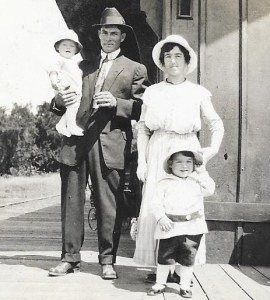 Donald, Clabe, Leora, and Delbert Wilson August 3, 1917, Guthrie County, Iowa
Donald, Clabe, Leora, and Delbert Wilson August 3, 1917, Guthrie County, IowaThis wasn’t the first time a family member was named for a politician. A generation earlier, before Leora was old enough to go to school, the Goff family tried to make a go of farming in Knox County, Nebraska.
Leora father, M. S. “Sherd” Goff, was a fan of Nebraska’s William Jennings Bryan, an orator and politician. Because of his faith in the wisdom of the common people, this populist was often called “The Great Commoner.” At the 1896 Democratic National Convention, Bryan delivered his “Cross of Gold speech” which attacked the gold standard. The Democratic convention nominated Bryan for president, making Bryan the youngest major party presidential nominee in U.S. history.
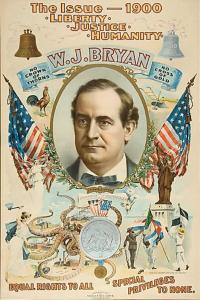
When Sherd and Laura Goff’s third son was born in January 1896, they named him Jennings Bryan Goff.
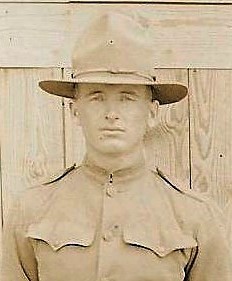 J. B. Goff was one of the three Goff brothers drafted for WWII and shipped to France. All three survived.
J. B. Goff was one of the three Goff brothers drafted for WWII and shipped to France. All three survived.The Goff’s “went bust” in Nebraska and returned to Guthrie County, Iowa. According to Leora Wilson’s memoirs, she and two brothers wore Bryan caps to school at Stuart.
Probably only people interested in history would have any idea that these two relatives were named for admired politicians. As an adult, Jennings Goff went by “J.B. Goff.”



